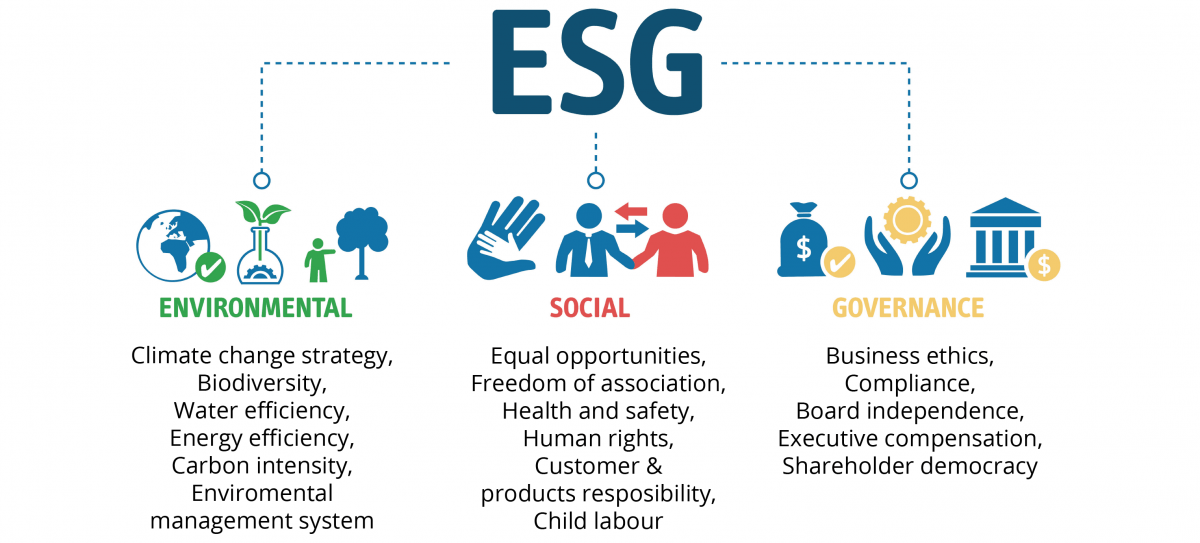In recent years, the business world has witnessed a significant shift towards a more sustainable and responsible approach to corporate practices. This paradigm shift is often encapsulated by the term ESG Meaning, which stands for Environmental, Social, and Governance. This acronym has become a buzzword in boardrooms, investment circles, and among socially conscious consumers. In this article, we’ll delve into the meaning of ESG, its components, and the profound impact it has on businesses and the global economy.
Understanding ESG
ESG refers to a set of criteria that investors, analysts, and stakeholders use to evaluate a company’s performance and measure its societal and environmental impact. Let’s break down each component:
- Environmental (E):
- The “E” in ESG focuses on a company’s environmental impact and sustainability efforts. This includes assessing a company’s carbon footprint, resource usage, waste management, and overall commitment to ecological responsibility. Companies are increasingly being scrutinized for their environmental practices as concerns about climate change and resource depletion escalate.
- Social (S):
- The “S” in ESG assesses a company’s social responsibility and its impact on society. This encompasses a range of factors such as labor practices, employee relations, diversity and inclusion, community engagement, and adherence to human rights. Companies are expected to contribute positively to the communities in which they operate and to foster fair and ethical treatment of their employees.
- Governance (G):
- The “G” in ESG pertains to the governance structure and practices of a company. It evaluates the effectiveness of a company’s leadership, its adherence to ethical business practices, transparency, and overall accountability. Strong governance is crucial for maintaining the trust of investors and stakeholders and for ensuring the long-term success and stability of a company.
The Evolution of ESG
The concept of ESG Meaning has evolved over time, reflecting a growing awareness of the interconnectedness between business operations and broader societal and environmental issues. Initially, corporate responsibility was primarily associated with philanthropy and compliance with regulations. However, as global challenges such as climate change, social inequality, and ethical lapses gained prominence, there was a realization that companies could no longer operate in isolation from these issues.
The Rise of Sustainable Investing
One of the most significant impacts of the ESG movement has been the rise of sustainable investing. Investors are increasingly considering ESG factors when making investment decisions, recognizing that companies with strong ESG performance are better positioned for long-term success. This shift in investor behavior has prompted companies to integrate sustainability into their business strategies to attract investment and maintain a positive reputation.
ESG Reporting and Standards
As the importance of ESG factors has grown, so has the demand for standardized reporting. Various frameworks and standards have been developed to guide companies in disclosing their ESG performance transparently. Remarkable systems incorporate the Worldwide Announcing Drive (GRI), the Maintainability Bookkeeping Principles Board (SASB), and the Team on Environment related Monetary Divulgences (TCFD). Standardized reporting not only facilitates comparability among companies but also enhances accountability and ensures that ESG considerations are embedded into core business practices.
The Business Case for ESG
While some may view ESG Meaning as a set of altruistic principles, there is a compelling business case for its adoption. Companies that prioritize ESG factors often experience several tangible benefits:
- Risk Mitigation:
- By addressing environmental, social, and governance risks, companies can mitigate potential legal, regulatory, and reputational challenges. This proactive approach helps safeguard the business against unforeseen crises.
- Cost Savings:
- Sustainability measures, such as energy efficiency and waste reduction, can lead to significant cost savings in the long run. Adopting environmentally friendly practices not only benefits the planet but also contributes to a more efficient and cost-effective operation.
- Market Differentiation:
- Companies that excel in ESG performance can differentiate themselves in the market. This is particularly relevant as consumers become more conscious of the social and environmental impact of their purchasing decisions.
- Access to Capital:
- Investors are increasingly allocating capital to companies with strong ESG credentials. Access to sustainable finance and the ability to attract socially responsible investors can provide a competitive advantage.
- Talent Attraction and Retention:
- Employees, especially the younger generation, are placing a higher value on working for socially responsible and ethically sound companies. Prioritizing ESG can attract top talent and contribute to employee satisfaction and retention.
Challenges and Criticisms
While the ESG Meaning movement has gained momentum, it is not without its challenges and criticisms. Some common concerns include:
- Lack of Standardization:
- The absence of a universally accepted ESG framework has led to inconsistency in reporting practices. This makes it challenging for investors and stakeholders to compare the ESG performance of different companies.
- Greenwashing:
- Some companies engage in “greenwashing,” a practice where they exaggerate or misrepresent their environmental and social initiatives to create a positive image. This undermines the credibility of ESG efforts and highlights the need for rigorous verification and transparency.
- Short-Termism:
- Critics argue that the emphasis on quarterly financial results may deter companies from making long-term investments in ESG initiatives, as the benefits may not be immediately apparent.
- Limited Impact in Certain Industries:
- ESG criteria may be more challenging to apply in certain industries, such as extractive industries, where the environmental impact is inherent to the business.
Conclusion
ESG Meaning is more than just a corporate buzzword; it represents a fundamental shift in how businesses perceive their role in society and the broader ecosystem. As the world grapples with complex challenges ranging from climate change to social inequality, the adoption of ESG principles is increasingly seen as imperative for sustainable and responsible business practices. Companies that embrace ESG not only contribute to positive societal and environmental outcomes but also position themselves for long-term success in an evolving and conscientious global economy.
